Five comic book stories and original songs made their vinyl debut at a time when Harvey could “Irona-cally” have used The Poor Little Rich Kid’s financial help.

RICHIE RICH: 4 GREAT STORIES!
Parachute Records (Polygram) #422-811-109-1-M-1 (12” 33 1/3 RPM / Stereo / 39 minutes)
Stories: “The Prisoner of Zendor,” “The Abominable Snow Plan,” “Space Scam,” “Mind Over Metal.”
Songs: “Richie Rich,” “Professor Keenbean” by “Bugs” Bower, Arthur Korb.
RICHIE RICH: MYSTERIES OF THE DEEP!
Parachute Records (Polygram) #422-811-110-1-M-1 (12” 33 1/3 RPM / Stereo / 39 minutes)
Stories: “Mysteries of the Deep,” “School Days, School Days,” “The Eerie Jungle.”
Songs: “Richie Rich,” “Dollar,” “Cadbury” by “Bugs” Bower, Arthur Korb.
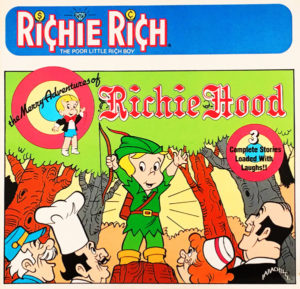 RICHIE RICH: THE MERRY ADVENTURES OF RICHIE HOOD
RICHIE RICH: THE MERRY ADVENTURES OF RICHIE HOOD
Parachute Records (Polygram) #812-576-1-M-1 (12” 33 1/3 RPM / Stereo / 40 minutes)
Stories: “The Merry Adventures of Richie Hood,” “The Vanishing Mystery,” “The Secret of Fog Island.”
Songs: “Richie Rich,” “The Ballad of Richie Hood,” “Reggie Van Dough,” “Dollar,” “Cadbury” by “Bugs” Bower, Arthur Korb.
RICHIE RICH: DOUBLE TROUBLE!
Parachute Records (Polygram) #814 233-4 M-1 (12” 33 1/3 RPM / Stereo / 37 minutes)
Stories: “The Great Pretender,” “Sky-Jack,” “Double Trouble.”
Songs: “Richie Rich,” “The Great Pretender,” “Cadbury,” “Dollar,” “Jackie Jokers” by “Bugs” Bower, Arthur Korb.
(A fifth LP with three stories, Richie Rich’s Surprise Party, was also released in 1983.)
Albums Released in 1983. Writer/Producer: “Bugs” Bower, Arthur Korb. Album Designs: David Lartaud.
Comic book superstars in today’s mainstream mindset are primarily considered in the superhero category. Collectively, that reflects the immense popularity of those franchises and the endless permutations of the various super characters. However, the impact and endurance of teen comics like the Archie series, “funny animals” the Disney ducks and kid-friendly comics like the classic Harveys are not to be underestimated.
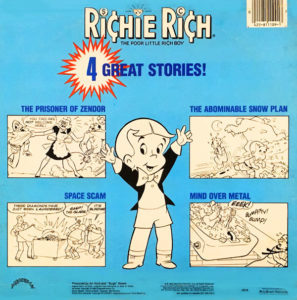 Without having a cartoon series as a springboard, Richie Rich became the most successful character in the Harvey Comics series (now owned by Classic Media, which was purchased by DreamWorks, which is now the property of Universal). Harvey originally built its children’s comics line on the animated creations of Famous Studios, the facility in New York that Paramount established after closing down the Max Fleischer studio in Miami. Casper the Friendly Ghost was the most popular character at first, starring in shorts, TV series and live-action projects. But Richie Rich emerged as a Harvey comic book character and surpassed the others, though they did quite well.
Without having a cartoon series as a springboard, Richie Rich became the most successful character in the Harvey Comics series (now owned by Classic Media, which was purchased by DreamWorks, which is now the property of Universal). Harvey originally built its children’s comics line on the animated creations of Famous Studios, the facility in New York that Paramount established after closing down the Max Fleischer studio in Miami. Casper the Friendly Ghost was the most popular character at first, starring in shorts, TV series and live-action projects. But Richie Rich emerged as a Harvey comic book character and surpassed the others, though they did quite well.
Richie clicked with kids, allowing them to live vicariously through his unlimited resources. In some ways, he was a humanized best-friend version of Scrooge McDuck. He had lots of cool things in his elaborate home, went to fantastic places and often contended with crooks that sought his family riches. The writers and artists surrounded him with a group of characters who could generate lots of stories.
When the comics were adapted for the first time for animation in 1980, Hanna-Barbera emphasized the visual gadgetry, including the inventions of Professor Keenbean and robot housekeeper Irona. There were a lot of opinions about how the characters should look on TV. Scott Shaw!, who was one of the character designers (as well as layout artist with Disney Legend Floyd Norman), recalled: “I wanted to depict him in his ‘classic’ image, with a big head and a small body with stumpy legs and a big bow tie. The bigshots at H-B and ABC didn’t agree with that at all.” Shaw was tasked with creating a huge amounts of drawings of Richie between the ages of six and sixteen before they settled on twelve years old.
In an interview appearing in Mark Arnold’s book, The Harvey Comics Companion, Story Editor Mark Evanier shares several stories about the show, include his battles with the network censor. “I’d finish a script and send it over, knowing there was absolutely nothing in to which they could possibly object… but they’d misinterpret something or come up with a ‘hidden meaning’ and we’d argue a lot.”
One thing that might not have garnered bickering was the catchy, ‘40s-style theme song:
By the time Parachute Records was up and running, and the Richie Rich records were being produced, Harvey was experiencing financial issues. The company had gone through a number of lawsuits, just nixing a deal to sell the properties to Marvel Comics. The record albums were released just as the company was entering a relatively dormant publication period–compared to a few years earlier when as many as 33 different Richie Rich titles might appear on newsstand in the same month!
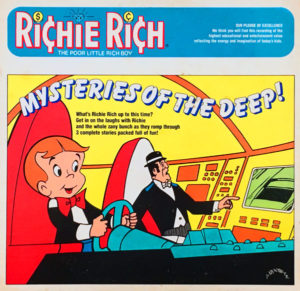 “When Harvey ceased in 1982, they always thought it would be temporary, so that’s why they went ahead with the albums,” Mark Arnold explains. A few paperback books of Harvey material were released through 1985, followed by more reprints and small amount of new material through 1989. Then Harvey changed hands for good.
“When Harvey ceased in 1982, they always thought it would be temporary, so that’s why they went ahead with the albums,” Mark Arnold explains. A few paperback books of Harvey material were released through 1985, followed by more reprints and small amount of new material through 1989. Then Harvey changed hands for good.
Parachute Records began in the disco ‘70s as an pop music offshoot of Polygram’s Casablanca label, reinventing itself in 1983 as a children’s label. Casablanca had attempted children’s records before, most notably with Ronald McDonald. Like the earlier Casablanca discs, the Parachute LP’s, cassettes and little LP book-and-records were premium quality, designed to compete with Disneyland, Sesame Street, and the high-end releases of Peter Pan and Kid Stuff. The records were quality-controlled for flaws at the factory and pressed on “virgin vinyl”–fresh, non-recycled plastic free of impurities that causes surface noise on budget records. The proof is in the listening.
Producer Arthur Korb was a decades-long veteran of Peter Pan Records, responsible for many of the action/adventure albums and read-alongs in the Power Records line, which were ubiquitous in late 1970’s. Korb’s records have an unmistakable radio drama-inspired style of stern, frenetic dialogue; walking shoes that sound like wooden clogs; familiar production library music and a “stable” of uncredited actors that sometimes include Peter Fernandez and Peter Mark Richman (though he has not personally confirmed it). Bob Kaliban appears on the Richie Rich discs as Jackie Jokers. (We featured Korb’s Fangface album for Peter Pan in a recent Spin.)
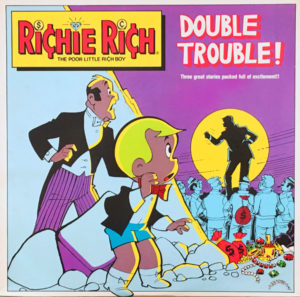 Partnering with Korb and the music and story adaptation is Julliard-education Maurice “Bugs” Bower, a familiar name to collectors of Pickwick and Happy Time records of the late ‘60s and early ‘70s. (We did a Spin about his LP version of You’re a Good Man, Charlie Brown here) Bower worked with many big names like Liza Minnelli, Bing Crosby and Steve Allen, won a Grammy and nine Gold Records.
Partnering with Korb and the music and story adaptation is Julliard-education Maurice “Bugs” Bower, a familiar name to collectors of Pickwick and Happy Time records of the late ‘60s and early ‘70s. (We did a Spin about his LP version of You’re a Good Man, Charlie Brown here) Bower worked with many big names like Liza Minnelli, Bing Crosby and Steve Allen, won a Grammy and nine Gold Records.
As per the early (and fortunately long-gone) policies of Archie and Disney comics, Harvey did not credit their writers and artists, so it’s not clear who actually wrote all sixteen stories on these five albums. Korb and Bower appear to have written some and adapted others. (Richie Hood is definitely a comic book adaptation, as you will read below.) Sections of repurposed comic art is also uncredited.
Korb and Bower’s peppy little songs are original and do not bear any resemblance to the Harvey Records of the early ‘70s (see this Spin). The songs are spread unevenly among the stories, almost appearing out of nowhere, alone or in pair, some repeating from album to album. They have a kiddie pop kind of sound, reminiscent of the way Hanna-Barbera handled their character songs on their HBR label.
The actors and singers, as on all the Peter Pan/Power adventure story records, are anonymous except to eager ears who are keen to compare vocal tones and sleuth them out. Children’s records are not always notable for copious, detailed liner notes.
Still, these are very well-produced productions that bring classic comic books to life through audio. It’s a fair guess that their timing in the marketplace didn’t help sales, as records were quickly being supplanted by cassettes (easier to handle by youngsters) and very soon, by compact discs. They’ve never been re-released.
“The Merry Adventures of Richie Hood,” Part 1
This is based on the work of Angelo DeCesare, author of the “Flip’s Fantastic Journal” series and many stories for the Sonic the Hedgehog series and its spinoffs. “In 1979, during my second year at Harvey Comics, when I was 24 years old, I wrote and illustrated a three-part story, “The Merry Adventures of Richie Hood”. This was a spoof of the 1938 Warner Brothers classic, “The Adventures of Robin Hood”, which starred Errol Flynn. I had a lot of fun doing it and I appreciated the fact that Sid Jacobson, Harvey’s editor-in-chief, gave me carte blanche when it came to creating my own Richie Rich stories.” (Thanks to Mark Arnold for assisting with this information.)
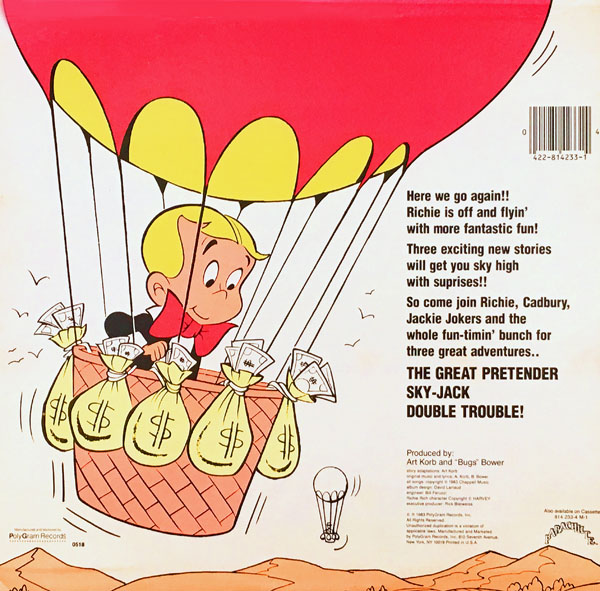


 GREG EHRBAR is a freelance writer/producer for television, advertising, books, theme parks and stage. Greg has worked on content for such studios as Disney, Warner and Universal, with some of Hollywood’s biggest stars. His numerous books include Mouse Tracks: The Story of Walt Disney Records (with Tim Hollis). Visit
GREG EHRBAR is a freelance writer/producer for television, advertising, books, theme parks and stage. Greg has worked on content for such studios as Disney, Warner and Universal, with some of Hollywood’s biggest stars. His numerous books include Mouse Tracks: The Story of Walt Disney Records (with Tim Hollis). Visit 






















































I’d like to see Jerry’s Dark Horse collection of Richie Rich comics reissued!
‘The actors…as on all the Peter Pan/Power adventure story records, are anonymous except to eager ears who are keen to compare vocal tones and sleuth them out’
Many working on NYC-based 60s/70s children’s records also did a ton of dubbing (foreign films) for Titan Studios.
Great post Greg! A topic near and dear to my heart! I just posted a link to it on the Harvey Mercheum:
https://www.harveymercheum.com/2018/09/greg-ehrbar-post-about-the-richie-rich-story-records/
Thank you, Jonathan!